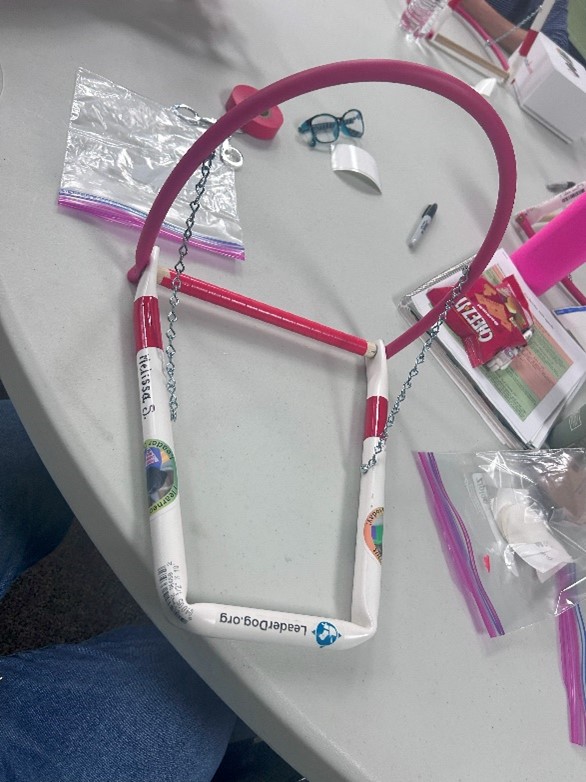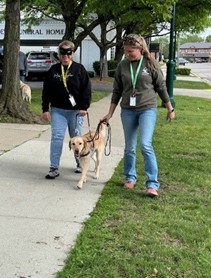by Melissa Snyder, Region 5 Outreach Coordinator, COMS
One thing that I have learned about being a Certified Orientation and Mobility Specialist (COMS) is the value of learning through hands-on experiences. At times this experience comes through working with students and clients when providing instruction, and at other times from being lucky enough to take part in opportunities like attending the Leader Dogs Pro Seminar. I am thankful for having the opportunity to travel to Rochester, MI, this summer and spend a few days at the Leader Dogs campus doing just that.

Day 1 consisted of a tour of the Canine Development Center and veterinary clinic. We were given an in-depth explanation of guide dog development, requirements and training. We learned about Guide Dog Readiness and dove into the Stellar Trek GPS device. The afternoon consisted of learning about Deafblind clients and building a Juno during a make-and-take session. A Juno device simulates the experience of using a dog guide. The afternoon ended with some hands-on practice using the GPS Stellar Trek device in downtown Rochester. In the evening many of the 20 attendees participated in an escape room while wearing blindfolds and simulators. We escaped with 1 minute to spare!
Day 2 was filled with hands-on learning opportunities that had a big impact. We spent the day outdoors observing working units (guide dogs and Guide Dog Mobility Instructors or GDMIs). We were able to work with the instructors and a guide dog under blindfold where we experienced traveling in residential and business areas. We participated in “Bad Juno” walks which were led by apprentices. Juno made some mistakes, and participants were able to discuss problem-solving strategies. We enjoyed a sack lunch while learning about diabetes management and support for clients and students. The session ended with an afternoon spent at Oakland University Campus with GDMIs, COMS, and Outreach staff from Leader Dogs. The group worked on patterning, open area travel, and route support including targeting of landmarks.
I could go on and one about the puppies and dogs, but here are some interesting facts I learned while at Leader Dogs.
- 33% of guide dog candidates graduate and are matched with a client. Dogs who do not graduate are career changed. This may include working with law enforcement, becoming ambassadors, or being adopted.
- You can volunteer to be a puppy raiser anywhere in the country if you can pick up and drop off the puppy at Leader Dogs. Puppies are picked up between 7-10 weeks old and raised by families, individuals, and even college students. The goal is for the puppies to have some basic training in the home while being exposed to as many things as possible before being returned to Leader Dogs between 12-15 months of age. Then, they will continue further training for their future as a guide. Dogs who don’t graduate are available to adopt and may be adopted by the puppy raiser. When a dog is retired, if the family or individual chooses not to keep the dog (perhaps due to them needing to be paired with a new dog), the raiser may end up getting that dog back to live out their days.
Leader Dogs has veterinary services for the dogs; the facility truly is top-notch.

Melissa under blindfold walking with Viking, a dog guide in training, and a GDMI. - There are several misconceptions about the skills required for someone to be approved to receive a guide dog from Leader Dogs. Leader Dogs follows the standards from the International Guide Dog Federation Applicant Standards; this may vary from agency to agency:
- Individuals must be able to travel independently. Guide Dogs are not equipped with internal GPS. They may learn some familiar routes with some practice and training; however, they must be taught the route and work consistently to maintain their skills.
- Individuals must have independent self-care skills, be a minimum age of 16, have the ability to walk at least 30 minutes at a time multiple times per day, may not be dependent on a walker or wheelchair, and other adults living in the same home must be aware prior to applying for a dog.
- Applicants must be able to maintain the following standards for 7-10 years, which is the average working life of a guide dog:
- Motivation to train and work with a dog, including advocacy, plan of care, and walking independently multiple times each week.
- Relationship skills to develop and maintain a positive bond with the guide dog. Primary caretaking responsibilities must be provided by the applicant.
- Physical ability (guide dogs are often large breeds).
- Orientation to navigate routes independently, problem solve, and not rely solely on technology for travel.
- Work for a guide dog must include a minimum of two walking routes that are used at least 5 times per week and be 15 minutes long.
- Must meet the legal blindness standards that require the use of a primary mobility aid. Must demonstrate the use of a white cane and not operate a motor vehicle.
- Must be able to use safe street crossing strategies.
- The home must be safe and provide adequate space for a guide dog.
- Resources to provide and care for the dog, including financial ability to provide regular vet care, food, toys, and any medications (approximately $1500 per year).
All programs provided to students and clients at Leader Dogs are free of charge and include:
- Guide Dog - a variety of free training options when receiving a guide dog, including on-campus residential, in-home delivery, flex (combining the benefits of on-campus and in-home options) and adaptive services including DeafBlind training.
- Orientation & Mobility – free programs that focus on how to use a white cane, maintaining orientation while traveling, and overall safety. This one-on-one, week-long training is customized for introduction to O&M, brush-up, guide dog readiness, advanced, in-home, and Teen O&M.
- Teen Summer Camp - free program for ages 16 and 17 that combines fun activities like ziplining and rock wall climbing with leadership skills training and meeting peers facing similar challenges. Campers receive a free HumanWare GPS to help increase their travel independence and spend a day with guide dog mobility instructors and Leader Dogs in training to learn about living and working with a guide dog.
The Leader Dogs Pro Seminar that I attended was through an application process. Travel to and from Michigan was the only expense not covered, although they do provide travel to and from the airport. All meals on site were also provided to attendees.
Here are some additional resources on what was covered at Leader Dogs Pro Seminar:
- Tactile Maps Easily | Touch Mapper
- Hex Withrow's ASL Signs for O&M: https://www.youtube.com/watch?v=fEOX9c9UolE
- HKNC Website: https://www.helenkeller.org/courses/communicating-with-individuals-who-are-deafblind/
Leader Dog Resources:
- Virtual Learning - Leader Dogs for the Blind- A great place to refer clients to learn more about guide dogs or O&M at Leader!
- Taking the Lead - Leader Dogs for the Blind- Leader Dog’s podcast!
